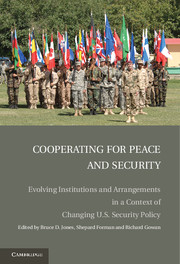 Cooperating for Peace and Security
Cooperating for Peace and Security Book contents
- Frontmatter
- Contents
- Contributors
- Foreword
- Acknowledgments
- I FRAMEWORK
- II ADAPTING COLD WAR INSTITUTIONS
- III NEW TOOLS, NEW MECHANISMS
- 10 Normative Evolution at the UN: Impact on Operational Activities
- 11 Constructing Sovereignty for Security
- 12 New Arrangements for Peace Negotiation
- 13 International Humanitarian Cooperation: Aiding War's Victims in a Shifting Strategic Environment
- 14 The Evolution of Regional and Subregional Collective Security Mechanisms in Post–Cold War Africa
- 15 International Courts and Tribunals
- IV CONCLUSIONS
- Index
- References
10 - Normative Evolution at the UN: Impact on Operational Activities
Published online by Cambridge University Press: 22 January 2010
- Frontmatter
- Contents
- Contributors
- Foreword
- Acknowledgments
- I FRAMEWORK
- II ADAPTING COLD WAR INSTITUTIONS
- III NEW TOOLS, NEW MECHANISMS
- 10 Normative Evolution at the UN: Impact on Operational Activities
- 11 Constructing Sovereignty for Security
- 12 New Arrangements for Peace Negotiation
- 13 International Humanitarian Cooperation: Aiding War's Victims in a Shifting Strategic Environment
- 14 The Evolution of Regional and Subregional Collective Security Mechanisms in Post–Cold War Africa
- 15 International Courts and Tribunals
- IV CONCLUSIONS
- Index
- References
Summary
The operational activities of international organizations do not occur in a normative vacuum. They are shaped by the normative climate in which they occur, and they in turn shape that climate. This chapter elucidates that proposition by tracing three especially important normative developments over the last fifteen years: the emerging “Responsibility to Protect (R2P),” the growing consensus on the value of democratic governance, and the centrality of counterterrorism to global security policy. I will test the impact of norms by reviewing operational activities that have been most deeply affected, primarily in the field of peace operations, but also humanitarian action, development assistance, and nonproliferation.
These developments have occurred through a dynamic process that involves influential member states, key figures within international institutions, and nongovernmental entities. States are still the primary actors – especially the United States – but because the process has become more fluid, normative evolution at the United Nations (UN) is not driven entirely by the executive branches of government and their diplomatic representatives in New York and Geneva. The UN is both a venue for interaction among states and an “organizational platform” where actors other than states wield influence.
The chapter proceeds as follows. The next section presents a theoretical account of how and why norms matter in international politics and considers the role of the United States in promoting norms.
- Type
- Chapter
- Information
- Cooperating for Peace and SecurityEvolving Institutions and Arrangements in a Context of Changing U.S. Security Policy, pp. 187 - 214Publisher: Cambridge University PressPrint publication year: 2009


